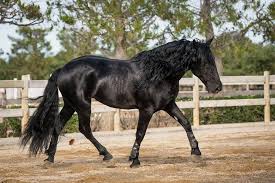
Sicilian
Conditions of detention
Sicilian horses are well-adapted to the Mediterranean climate of their native island. They thrive in environments that provide a mix of pastureland and rugged terrain, where they can exercise and forage. They need shelter to protect them from the intense summer sun and occasional rain.
Useful Fact: Sicilian horses are adapted to rough, hilly terrain, making them particularly well-suited for outdoor living in areas with varied landscapes.
Nutrition and diet
Sicilian horses require a balanced diet that consists mainly of high-quality forage, such as hay and grass. Given their natural hardiness, they often do well on a forage-based diet with minimal supplementation, unless they are in heavy work.
Useful Fact: The Sicilian horse’s metabolism is efficient, allowing them to maintain good health and condition on a relatively simple diet, reflecting their origins in a harsh, sometimes sparse environment.
Health
Sicilian horses are generally healthy and robust, with a strong constitution that has been honed over centuries of survival in Sicily’s demanding environment. However, like all horses, they require regular veterinary care, including vaccinations, deworming, and dental checks.
Useful Fact: The breed’s genetic diversity and long history of natural selection contribute to its overall resilience and lower susceptibility to many common equine diseases.
Grooming and care
Regular grooming is important to maintain the health of a Sicilian horse’s coat and skin, especially given the dusty conditions they might encounter in their native habitat. Their manes and tails should be brushed to prevent tangles, and regular hoof care is essential to prevent issues like thrush or cracks.
Useful Fact: Sicilian horses typically have strong, durable hooves, a trait developed from living in rocky and uneven terrains, making them relatively low-maintenance in terms of hoof care.
Education and training
Sicilian horses are known for their intelligence and willingness to work, making them relatively easy to train. They excel in a variety of disciplines, from riding and light draft work to more modern equestrian sports, though they are less common in competitive arenas.
Useful Fact: The breed’s natural sure-footedness and calm temperament make them particularly well-suited for trail riding and other activities that require stability and endurance.
Toys and entertainment
Sicilian horses benefit from mental stimulation and physical activity. They enjoy exploring new environments and can be entertained with activities like trail riding, obstacle courses, or simple toys that encourage problem-solving.
Useful Fact: Given their history of working in diverse and challenging environments, Sicilian horses are naturally curious and benefit from activities that engage their minds as well as their bodies.
Safety
Sicilian horses are generally calm and steady, but as with any horse, they require secure fencing and a safe environment to prevent accidents. Their natural environment often included rocky and uneven terrain, so they are typically careful and sure-footed.
Useful Fact: Their steady temperament and adaptability to various environments make Sicilian horses relatively low-risk in terms of safety concerns, especially in familiar settings.
Accessories
Sicilian horses require standard tack, including well-fitted saddles and bridles, tailored to their build. Given their versatility, they may be used in a variety of riding disciplines, so tack should be chosen based on the specific activity.
Useful Fact: Sicilian horses, with their sturdy and compact build, often require tack that is both durable and comfortable, particularly for longer rides or work in challenging terrain.
Socialization
Sicilian horses are social animals and thrive on interaction with other horses and humans. They do well in herd environments and enjoy the companionship of other horses, which helps them maintain their mental well-being.
Useful Fact: The breed’s history as a working animal in close contact with humans has made Sicilian horses particularly adept at forming strong bonds with their handlers.
Travel and Transportation
Sicilian horses generally travel well, but like all horses, they require a comfortable, well-ventilated trailer. Regular breaks during long journeys for water and rest are important to keep them comfortable and healthy.
Useful Fact: Sicilian horses, due to their calm and adaptable nature, often handle transportation better than more high-strung breeds, making them reliable travel companions.
Behavior and psychology
Sicilian horses are known for their calm, steady demeanor and strong work ethic. They are intelligent and capable, with a natural adaptability that reflects their diverse historical roles. Their temperament makes them well-suited for a variety of tasks, from leisure riding to light agricultural work.
Useful Fact: The breed’s long history of adaptation to challenging environments has made Sicilian horses particularly resilient and easy to manage, even in less-than-ideal conditions.
Legal aspects
Owning a Sicilian horse may involve specific legal considerations, particularly if they are used in breeding or competition. Registration with relevant breed organizations can help preserve the breed’s lineage and maintain its historical significance. Compliance with local animal welfare laws is also essential.
Useful Fact: Efforts to preserve and promote the Sicilian horse often include initiatives to document and register individual horses, helping to maintain the breed’s purity and historical value.


